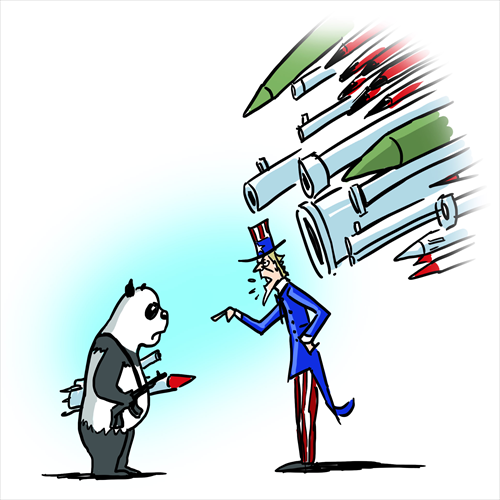US containment frays China's nerves

Illustration: Liu Rui/GT
American realists believe that China is departing from former leader Deng Xiaoping's moderate foreign policy and becoming more assertive toward its neighboring countries and the US. Arguments for China's assertiveness are many, but the US and its allies are most concerned about China's fast growing military expansion and modernization.
To fairly understand Chinese military expansion, it is helpful to address an obvious question: What is pushing China to accelerate its military development?
After Deng's death, China's national security issues have been greatly increasing. However, China does not have a single formal alliance. The new Chinese leadership reconfirmed that China will not form an alliance with Russia. Therefore, China has to develop its own military power in order to secure its national interest.
The central task of the Communist Party of China is to maintain the socialist system through improving the living standards of the Chinese people. China does not have the intention to create conflicts with its neighboring countries and the US, because any military confrontations could interrupt China's economic development.
In late October, Chinese President Xi Jinping convened a diplomatic work conference at the highest level and emphasized the principle of "friendship, honesty, benefit, and tolerance" in dealing with its neighboring countries. This shows that China's new leadership remains committed to the path of peaceful development and the strategy of win-win cooperation with the outside world.
To be sure, China's military modernization is a response to the "pivot" to the Asia-Pacific region by the US. American liberals argue that the US can accommodate China's peaceful rise and welcome China to join the existing global order. But in reality, it is hard to believe that the US is willing to allow China to reach its maximum strength.
US President Barack Obama in the State of the Union Address in 2012 made it very clear that the US cannot afford to fall behind developing nations such as China. This explains why US foreign policy has become more assertive in Asia.
Under the "pivot to Asia," the US has deepened its military ties with China's surrounding countries and deployed nearly 100,000 military personnel in the Asia-Pacific region, including Japan, South Korea, Guam, the Philippines, Singapore and Australia. Last year, then secretary of defense Leon Panetta announced that 60 percent of the US Navy will be deployed in the Pacific by 2020. Recently, Secretary of Defense Chuck Hagel promised that the US will increase military aid to Southeast Asian countries by 50 percent.
Many Chinese scholars are convinced that the US will not give up the policy of containing China. More and more people inside the circle of Chinese foreign policy decision-making process are convinced that China's security can only be guaranteed through military and economic power.
Many analysts do not believe that the meeting between Xi and Obama in Sunnylands in June improved anything between the two countries. The US and China only smile for the cameras, but both are thinking over detailed plans on how to win a potential conflict. Any miscalculation could trigger an unthinkable war.
The Chinese people still clearly remember the century of humiliation and are no longer willing to be bullied by foreign countries. Although China's military development is a response to the "pivot" to Asia, the standoff between the two countries is a dangerous game. The two will not be able to escape this dilemma without a compromise.
Military confrontation is a zero-sum game. Some 10 years ago political scientist Joseph Nye predicted that the US could lose if it focused on military dimension and failed to fully use economic and diplomatic powers. Today, he suggests again that the US should restrain the military dimension of its power and ensure that China does not feel encircled. However, so far the US has achieved nothing but only annoyed China.
The author is associate professor of contemporary China at Hobart and William Smith Colleges in New York. opinion@globaltimes.com.cn